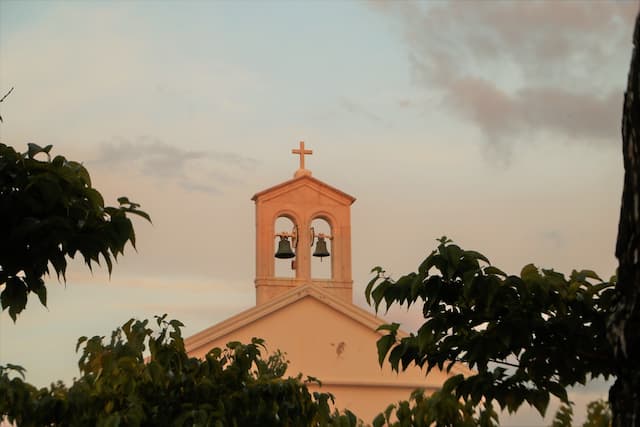Yeshua the Messiah – the Same Yesterday, Today and Forever

1.0 CONTEXT
Philip found Natan’el and told him, “We’ve found the one that Moshe [Moses] wrote about in the Torah, also the Prophets — it’s Yeshua Ben-Yosef from Natzeret!” [John 1:45] The “Torah [Law] and the Prophets” was a title for the Old Testament before the New Testament was written.
Philip understood the Old Testament was about Yeshua, which is why he believed Yeshua was the Messiah. He expected Nathaniel to be convinced He was the Messiah as well because he would also recognize Him as the One identified in the Torah [Law] and the Prophets.
Many people enjoy reading about Yeshua [Jesus] in the New Testament without knowing He’s revealed throughout the Old Testament in types and shadows.
The Bible is one big story of Yeshua [Jesus], but we have to be careful to resist the temptation to find Yeshua [Jesus] in every single detail of the Old Testament—which would mean we are then reading the Bible as allegory, where the basic meaning of the text is set-aside for a hidden, often mysterious meaning underneath of it.
Yeshua [Jesus] is pictured or prophesied about in each of the 66 Bible books, from Genesis to Revelation. He is also seen through types in the lives of different characters in the Bible. So how do we show that all of the Bible is about Yeshua without going too far?
Here are the ways to see Yeshua in the Old Testament correctly: Messianic Prophecies [e.g. Isaiah 7:14 – The prophecy of the virgin birth], Images of Yeshua [e.g. Genesis 22 – Abraham’s test to sacrifice Isaac is a picture of God sacrificing His Son], Gospel Truths [e.g. Romans 3:20 – The law shows us our inability to meet God’s perfect standard] and Redemptive History [e.g. Adam and Eve that someone (the Messiah) will be coming who would crush Satan.
Much of the Old Testament advances this narrative and leads us directly to the manger in Bethlehem, the cross on Calvary, and the empty tomb in the garden.]
God gave us a multitude of pictures that foreshadow Yeshua in the Old Testament. Unlike prophecies, images do not point directly to something about the life and ministry of Yeshua (such as the virgin birth), but they do reveal part of God’s plan for Yeshua.
Many Old Testament images of Yeshua are affirmed in the New Testament, but not all are. Be careful when we come across what we believe is an image of Yeshua that is not supported in the New Testament.
2.0 SHADOWS AND TYPES OF YESHUA THE MESSIAH [JESUS CHRIST] IN ALL 39 BOOKS OF OLD TESTAMENT
Below is a breakdown of how He is shown through types, prophecies, titles and names in all the books of the Old Testament, Genesis to Malachi.
2.1 Genesis [The Seed of the Woman]
- Messiah would be born of the seed of a woman (Genesis 3:15)
- Messiah would be a descendant of Abraham, Isaac & Jacob (Genesis 12:3, 17:19, 28:14)
- Messiah would be a king in the line of Judah (Genesis 49:10)
- Typified in the person of Melchizedek (Genesis 14:18)
- The life of Isaac – the sacrificed son (Genesis 22)
- The life of Joseph – the rejected and sold brother (Genesis 37)
2.2 Exodus [The Passover Lamb, The Manna, The Rock]
- Typified in the life of Moses – the deliverer
- The Passover Lamb (Exodus 12)
- The Manna from Heaven (Exodus 16)
- The Rock struck at Horeb (Exodus 17)
- The Tabernacle – Brazen Altar, Lampstand, Table of Showbread, Ark of the covenant etc. (Exodus 25-30)
2.3 Leviticus [The High Priest, The Scapegoat]
- Typified in the sacrifices and offerings (Leviticus 1-7)
- In the Jewish festivals (Passover, Atonement, Leviticus 16, 23)
- In the scapegoat (Leviticus 16:7-9)
- In the person and duties of the High Priest (Leviticus 16)
2.4 Numbers [Bronze serpent upon a pole, Water from the Rock]
- Messiah would be a King (Numbers 24:17)
- Typified in the bronze serpent (Numbers 21:8-9)
- The Water from the Rock (Numbers 20)
2.5 Deuteronomy [The Prophet Like Moses]
- Messiah will be a prophet (Deuteronomy 18:15-19)
- Messiah would be worshipped by angels (Deuteronomy 32:43)
- Typified in the cities of refuge (Deuteronomy 4:41)
2.6 Joshua [The Captain of Our Salvation]
- Typified in the person of Joshua (our leader into the promised land)
- In the Promised Land
- In the Commander of the Army (Joshua 5:13-15)
2.7 Judges [The Lawgiver and Judge]
- Typified in the Judges (for He is true Judge of the living and the dead)
2.8 Ruth [The Kinsman Redeemer]
- Messiah would be a descendant of Boaz and Ruth (Ruth 4:12-17)
- Typified in the life of Boaz – The Kinsman Redeemer (Ruth 2:1)
2.9 1 & 2 Samuel [The Prophet of The Lord, The Rock]
- Messiah exalted by God with power (1 Samuel 2:10)
- Messiah would be a descendant of David (2 Samuel 7:12-16)
- Messiah would be the ‘Rock’ (2 Samuel 23:2-3)
- Typified in the life of David – The King in Exile (1 Samuel 22)
- The life of Jonathon – the faithful friend (1 Samuel 18:1-4)
2.10 1 & 2 Kings [The Reigning King]
- Typified in the life of Solomon (the Millennial Reign)
- In the life and miracles of the prophet Elisha (multiplying bread 2 Kings 4:42, healing leper 2 Kings 5)
2.11 1 & 2 Chronicles [The Glorious Temple]
- Messiah would be from the tribe of Judah (1 Chronicles 5:2)
- Typified in Solomon’s temple
- In the Wisdom of Solomon (2 Chronicles 9:22)
2.12 Ezra [The Faithful Scribe]
- Typified in person of Zerubbabel, the rebuilder of the temple (Ezra 4)
2.13 Nehemiah [The Rebuilder of the Walls]
- Typified in the person of Nehemiah, the rebuilder of the walls of salvation
2.14 Esther [Mordecai]
- Typified in the person of Mordecai
2.15 Job [The Dayspring From on High]
- Typified in the sufferings of Job and the blessings that would follow
2.16 Psalms [The Lord Who is Our Shepherd]
- Messiah would be the Son of God (Psalms 2:7, 12)
- Messiah would be resurrected (Psalms 16:8-10)
- Messiah would be despised & crucified (Psalms 22:6-8, 13)
- Messiah would be hated without cause (Psalms 69:4)
- Messiah would be Lord, seated at the right hand of God (Psalms 110:1, 5)
- Messiah would be in the line of Melchizedek (Psalms 110:4)
- Messiah would be the ‘stone’ rejected by the Jews (Psalms 188:22)
- Key Messianic Psalms: Chapters 2, 8, 16, 22, 45, 69, 89, 109, 110, 118
2.17 Proverbs & Ecclesiastes [The Wisdom of God, Son of God]
- Messiah would be from everlasting (Proverbs 8:22-23)
- Messiah would be the Son of God (Proverbs 30:4)
- Typified in the Wisdom of God (Proverbs 8:22-31)
2.18 Song of Solomon [The Lover & Bridegroom]
- Typified in the Bridegroom’s love for, and marriage to, the bride
2.19 Isaiah [The Suffering Servant]
- Messiah would be born of a virgin (Isaiah 7:14)
- Messiah would be Immanuel “God with us” (Isaiah 7:14)
- Messiah would be God and Man (Isaiah 9:6)
- Messiah would have the 7-fold Spirit upon Him (Isaiah 11:1-2)
- Messiah would heal the blind, lame, deaf (Isaiah 35:5-6)
- Messiah would be proceeded by a forerunner (Isaiah 40:3)
- Messiah would be a light to the gentiles (Isaiah 42:6)
- Messiah would be despised by the Jewish nation (Isaiah 49:7)
- Messiah would be whipped and beaten (Isaiah 50:6)
- Messiah would die as a guilt offering for sin (Isaiah 53:10)
- Messiah would be resurrected and live forever (Isaiah 53:10)
2.20 Jeremiah & Lamentations [God, The Weeping Prophet]
- Messiah would be God (Jeremiah 23:6)
- Messiah would be a righteous Branch (Jeremiah 23:5)
- Messiah would be our righteousness (Jeremiah 23:6)
2.21 Ezekiel [The Son of Man]
- Messiah would be a descendant of David (Ezekiel 34:23-24)
2.22 Daniel [The Son of Man coming in the clouds of Heaven]
- Messiah would be ‘a son of man’ given an everlasting kingdom (Daniel 7:13-14)
- Messiah would come 483 years after the decree to rebuild Jerusalem (Daniel 9:25)
- Messiah would be killed (Daniel 9:26)
- Revealed as the ‘stone’ (and His kingdom) that smashes the kingdoms of the world (Daniel 2:34, 44)
- Typified in the 4th man in the fiery furnace – one like ‘the son of gods’ (Daniel 3:25)
2.23 Hosea [The Bridegroom]
- Typified in Hosea’s faithfulness to his adulterous wife (Hosea 3)
2.24 Joel [The Baptizer with The Holy Spirit]
- Messiah will offer salvation to all mankind (Joel 2:32)
- Messiah would baptize people with the Holy Spirit (Joel 2:28-32)
2.25 Amos [The Burden Bearer]
- God would darken the day at noon during Messiah’s death (Amos 8:9)
2.26 Obadiah [The Mighty Savior]
2.27 Jonah [The Forgiving God]
- Typified in Jonah being 3 days and 3 nights in the belly of a fish (Jonah 1:17)
2.28 Micah [The Messenger with Beautiful Feet, Everlasting]
- Messiah would be born in Bethlehem (Micah 5:2)
- Messiah would be from everlasting (Micah 5:2)
2.30 Habakkuk [The Great Evangelist, Crying For Revival]
2.29 Nahum [The Avenger of God’s Elect]
- Messiah would come from Teman at His return, full of glory (Habakkuk 3:3)
- Typified in the life of Habakkuk (his intercession and prayer for his people)
2.31 Zephaniah [The Restorer of the Remnant]
2.32 Haggai [The Cleansing Fountain]
- Messiah would visit the 2nd temple (Haggai 2:6-9)
2.33 Zechariah [The Pierced Son, Priest, King, God]
- Messiah would be Priest and King (Zechariah 6:12-13)
- Messiah would be ride into Jerusalem on a donkey (Zechariah 9:9)
- Messiah would be God (Zechariah 11:12-13)
- Messiah would be pierced (Zechariah 12:10)
2.34 Malachi [The Son of Righteousness]
- Messiah would appear at the temple (Malachi 3:1)
- Messiah’s forerunner would come in the spirit of Elijah (Malachi 4:5)
3.0 FORESHADOWS AND PARTIAL FULFILMENT OF THE FORESHADOWS IN THE NEW TESTAMENT
3.1 Matthew [The Messiah]
- The Son of David (Matthew 1:1)
- The King of the Jews (Matthew 2:2)
- The Son of God (Matthew 2:15)
- The Bridegroom (Matthew 9:15)
3.2 Mark [The Miracle Worker]
- The Holy One of God (Mark 1:24)
- The Servant (Mark 10:45)
- The King of Israel (Mark 15:32)
3.3 Luke [The Son of Man]
- The Horn of Salvation (Luke 1:69)
- The Consolation of Israel: (Luke 2:25)
3.4 John [The Son of God]
- The Only Begotten Son: (John 1:14, 18)
- The Lamb of God (John 1:29, 36)
- The Bread of life (John 6:35)
- The Light of the World (John 8:1)
- The I AM! (John 8:58)
- The Door of the Sheep: (John 10:7, 9)
- The Good Shepherd (John 10:11)
- The Resurrection and life (John 11:25)
- The Way, the Truth, the Life (John 14:6)
- The True Vine (John 15:1)
3.5 Acts [The Ascended Lord]
- The Prince of Life (Acts 3:15)
- The Judge of the living and the dead (Acts 10:42)
- The Just One (Acts 7:52).
- The Hope of Israel (Acts 28:20)
3.6 Romans [The Justifier]
- The Rock of Offense (Romans 9:33)
- The Deliverer (Romans 11:26)
- The Lord of the dead and the living (Romans 14:9)
- The Root of Jesse (Romans 15:12)
3.7 1 & 2 Corinthians [The Last Adam]
- The First-fruits (1 Corinthians 15:23)
- The Last Adam (1 Corinthians 15:45)
3.8 Galatians [The One Who Sets Us Free]
- The Lord Jesus Christ (Galatians 1:3)
3.9 Ephesians [The Christ of Riches]
- The Head over All Things (Ephesians 1:22)
- The Cornerstone: (Ephesians 2:20)
3.10 Philippians [The God Who Meets Our Every Need]
- The Name above all names (Philippians 2:9)
3.11 Colossians [The Fullness of the Godhead]
- The Image of the Invisible God (Colossians 1:15)
- The Head of the body (Colossians 1:18)
- The Beginning (Colossians 1:18)
- The Firstborn from the dead (Colossians 1:18)
- The Hope of Glory (Colossians 1:27)
3.12 1 & 2 Thessalonians [The Soon Coming King]
- The Lord of Peace (2 Thessalonians 3:16)
3.13 1 & 2 Timothy [The Mediator between God And Man]
- The King of Ages (1 Timothy 1:17)
- The Mediator(1 Timothy 2:5)
3.14 Titus [The Blessed Hope]
- The Blessed Hope (Titus 2:13)
- The Great God and Saviour (Titus 2:13)
3.15 Philemon [The Friend, Closer Than a Brother]
- The Lord Jesus Christ (Philemon 3)
3.16 Hebrews [The Blood That Washes Away My Sins]
- The Heir of All Things (Hebrews 1:2)
- The Faithful High Priest (Hebrews 2:17)
- The Author and Finisher of our Faith (Hebrews 12:2)
3.17 James [The Great Physician]
- The Lord of Glory (James 2:1)
- The Judge at the door (James 5:9)
3.18 1 & 2 Peter [The Chief Shepherd]
- The Living Stone (1 Peter 2:4)
- The Chief Shepherd (1 Peter 5:4)
3.19 1 & 2 & 3 John [Everlasting Love]
- The Eternal Life (1 John 1:2)
- The Righteous (1 John 2:1)
3.20 Jude [The God our Saviour]
- The Only Wise God our Saviour (Jude 25)
3.21 Revelation [The King of Kings and the Lord of Lords!]
- The Alpha and Omega, the First and the Last: (Revelation 1:17, 22:13)
- The Lion of the Tribe of Judah (Revelation 5:5)
- The Word of God (Revelation 19:13)
- The King of Kings and Lord of Lords (Revelation 19:16)
- The Bright Morning Star (Revelation 22:16)
4.0 CONCLUSION
A full understanding of the New Testament is impossible without seeing it as the fulfillment of the Old Testament. Likewise, a full understanding of the Old Testament depends on our reading it as a preparation for the work of Messiah in the New Testament.
The totality of the Bible is God’s story. In the Old Testament, God forecasts what he will do in the future and who the Messiah will be and what he will do. The New Testament records the fulfillment of these promises and prophecies. The Bible is one big story of God revealing himself to man and working to bring about his plans for man.
The Feasts of Israel are set according to Scripture. They are also called the appointed seasons of the Lord. The foreshadows of Messiah that were related to the spring Feasts i.e. Passover (Heb. Pesakh), Unleavened Bread (Heb. Matsoth), First Fruits (Heb. Yom Havikurim) and Pentecost or Weeks (Heb. Shavuot) are already fulfilled accurately in the first coming of Yeshua the Messiah [Jesus Christ].
However the remaining foreshadows of Messiah mentioned in the fall Feasts i.e. Trumpets (Heb. Yom Tiruah), Atonement (Heb. Yom Kippur) and Tabernacles (Heb. Sukkoth) will soon be fulfilled by Yeshua (Jesus) in His second coming with the same accuracy as the spring Feasts.









